Homemade Bed Bug Spray: The Only Recipe You Will Ever Need 2024

Modern methods of bed bug treatment include chemicals that if used improperly can be harmful to your health. This is where a homemade bed bug spray steps in and saves the night.
In today’s article, I will teach you how to keep bed bugs at bay with natural, budget-friendly ingredients. I will also share the only homemade bed bug spray recipe you will ever need.
What Are Bed Bugs?
Bed bugs are small insects that survive on the blood of both people and animals. They’re active at night and they’re very good at dwelling in the soft, dark places and crevices.
Therefore, a mattress is a great place for them to settle, hence the term “bed bugs”. They’re difficult to see with the naked eye due to their small size (they’re about the size of rice).
However, if you and your family are experiencing unexplained bites at night, you’re probably sharing the bed with bed bugs. Their bites aren’t harmful. However, they’re uncomfortable.
You think that they suddenly appear uninvited. But they come in from the outside. You can pick them up at a friend’s house, during travels, hotels, or from buying second-hand items.
They have very flattened bodies, so they can easily slip through invisible crevices and cracks, and settle into your mattress. Without further ado, let’s get into the bug spray recipe.
Homemade Bed Bug Spray to Keep Bed Bugs at Bay
Homemade remedies for bed bugs aren’t pesticides. However, they’re just as effective, especially during an early infestation. Follow the next steps on how to make a vinegar bed bug spray.
Step 1: Buy white vinegar such as Kroger Brand, or Heinz Distilled.
Step 2: Fill a spray bottle with white vinegar. You can use UPC and ULINE bottles, or something else that you have on hand. You can add essential oils for a better effect. Then, tighten the lid securely.
Step 3: Spray the perimeter around the infected place with the vinegar along with crevices and cracks in the walls and tight places between furniture and underneath.
Step 4: If you notice any bed bugs, spray the solution directly onto them to kill them on contact. Or force them into the area you just treated with white vinegar.
Step 5: To prevent future infestation, spray all infected areas, including mattresses, furnishings, window sills, carpets, and walls. Spray the corners, surfaces, and undersides. Repeat this every week for a couple of months to notice a reduction in bed bugs.
WARNING: Never combine white vinegar with bleach. Otherwise, you will cause a toxic chlorine gas that can damage your health.
Pros:
- Can be utilized for short-term relief.
- It’s affordable and available at any store.
- Safe to use in homes with kids, dogs, and cats.
- Safe natural bed bug removal treatment.
- You can spray as much as you need.
Cons:
- Doesn’t work for a major infestation.
- Can have a toxic effect on some reptilian pets
- You won’t kill bed bugs permanently but push them into hiding.
- The low pH of vinegar can damage some furniture.
- The odor is horrific and long-lasting.
This homemade bed bug spray isn’t a long-term solution. However, it’s a quick fix for those on a budget. If the bed bugs don’t give up, contact a professional exterminator.
Watch this video to know more:
Do Essential Oils Kill Bed Bugs?
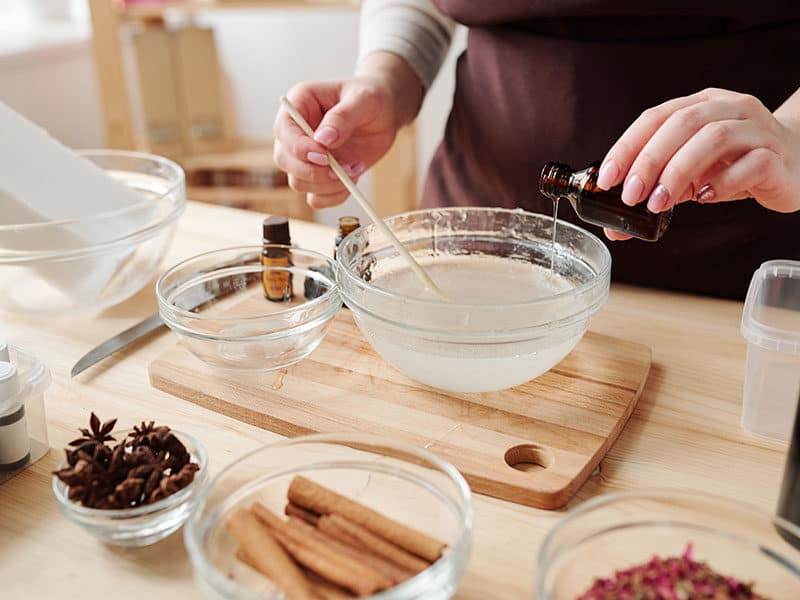
According to recent studies, essential oils kill bed bugs. You can either use one essential oil or mix some of the next essential oils and natural remedies to chase away bed bugs.
-
Tea Tree Oil
Tea tree oil is one of my favorite essential oils because of the fresh smell. It has antimicrobial properties, so it performs double duty as a cleaning agent on your property.
This essential oil destroys fungi and bacteria and neutralizes viruses on contact. Meaning, it’s perfect for destroying bed bugs too! It suffocates them as it works its way into their mechanism.
Tea tree oil is most effective when utilized undiluted but since the undiluted version isn’t safe for us, you will need to put 20 drops of oil in a spray bottle filled with water.
-
Lavender
The smell of lavender essential oil will make bed bugs nauseous and even kill them. People, on the other hand, find the smell quite pleasant. Wash your items with lavender soap to enhance the effectiveness of lavender oil. Also, spray diluted lavender oil and spread leaves over the affected areas.
-
Peppermint Leaves
Peppermint leaves offer the same effectiveness as lavender leaves and oil. Use the same method. Don’t forget to regularly vacuum up dried leaves and replace them with new ones occasionally.
-
Black Walnut Tea
Black walnut tea is a super-versatile tea that can chase away bed bugs. Just take your used black walnut tea bags and place them in affected areas like corners and other places around your home.
-
Sweet Flag
Sweet flag is a tall plant found in wetlands that work wonders for bed bug infestation. You can find the herbal version in a packet that you can combine with a solution and spray around your home.
-
Bean Leaves
According to 1943 research, the microscopic hairs on bean leaves work to both trap and strap the limbs of bag bugs. Meaning, they act like natural flypaper to trap various insects, including bed bugs. Put bean leaves on the floor of any room in your home with bed bugs and wait for the results.
-
Indian Lilac
Indian lilac leaves have a similar effect to other herbal, plant-based remedies. Thus, you can crush them and spread them onto affected areas.
You can also boil the leaves, strain the solution, and bathe in it. Likely, beg bugs will no longer bite you. Also, spray the solution anywhere around the home.
-
Thyme
People burn sage to keep evil spirits at bay. The good news is that it can also keep bed bugs at bay. You need to repeat the process every few days until they’ve vanished. However, practice fire safety.
-
Mint Leaves
Just like peppermint leaves, mint leaves can also prevent bed bugs from attacking you and your home. If you put crushed mint leaves around entry points, it will keep the bugs from entering your home.
-
Beauveria Bassiana
Beauveria bassiana is a parasitic fungus that survives on many insects, including bed bugs. It attacks bed bugs, making them immobile, infertile, and unable to feed off of you and your family.
-
Lemongrass
Most natural solutions only chase away bed bugs. Lemongrass, on the other hand, kills insects and their eggs thanks to its acid levels. Also, bed bugs hate the smell, so it does also act as a repellent.
-
Clove
Clove acts the same as lemongrass. Therefore, if you’re not a fan of lemongrass, use clove oil instead. If you place clove oil on your pillows and mattresses, it will destroy and chase away bed bugs.
-
Pyrethrum
Pyrethrum is an extract derived from chrysanthemums also known as a mum, a bright flower available in different colors. The extract is strong and attacks the nervous system of bed bugs.
-
Cayenne Pepper
When combined with other natural remedies like oregano and ginger, cayenne pepper works to destroy bed bugs on contact. Mix 1 tablespoon each of oregano oil, ground ginger, and cayenne pepper. Add the mixture into a spray bottle filled with water and spray to the affected areas.
Watch this video to know more:
10 Best Ways to Get Rid of Bed Bugs Naturally
Besides the homemade bed bug spray recipe and natural remedies, you can also use household items to get rid of bed bugs naturally. Let’s discuss some of the methods and tools that you can use.
Vacuum
Vacuum those babies up with a vacuum cleaner for bed bugs. Make sure that your vacuum cleaner has a powerful hose attachment. Vacuum every day while fighting the bed bug infestation.
Use your vacuum cleaner on the bedding, mattress, cushy chairs, and sofas. Also, don’t forget about the carpet, floors, and any cracks. Lastly, clean your vacuum cleaner properly afterward.
Steam Cleaning
If you don’t own a vacuum cleaner, you can utilize or buy a steam cleaner for a mattress. I prefer steaming over vacuuming because heat kills both bugs and eggs.
Washing Your Clothes and Bedding
Before you give your clothes and bedding the ultimate wash, check their labels to determine if they can withstand tumble drying and hot water. Wash everything that’s been infected with bugs. Hot water and dryer heat will help kill the colony.
Use a strongly-scented fabric softener. Scented sheets can keep bed bugs at bay. However, keep in mind that this isn’t a permanent solution.
Silica Gel
You can find these small packets in shoe boxes and food products. They will keep the items dry but also help destroy bed bugs. Grind up the beads and place the powder around the affected areas.
If you’ve got children or pets, avoid this method, as silica inhalation and direct exposure are harmful so opt for a baking soda instead. That’s right. Baking soda has a similar effect and will kill bugs.
Rubbing Alcohol
Rubbing alcohol will kill bed bugs and eggs on contact. If you’re searching for a quick fix, rubbing alcohol will do the trick. Apply it directly to the bugs or pour it in a spray bottle and spray away.
Hairdryer
If you’re tired or don’t have time to wait for other solutions to kill the bed bugs, use the hairdryer. Point the heat over the affected places to destroy the bugs and sleep bug-free for the night.
Stiff Brush
Use a stiff brush over the mattress seams to dislodge any clinging eggs and their parents that didn’t get sucked into the vacuum cleaner. Use the vacuum cleaner again just to make sure they’re gone.
Double-Sided Tape
Wrap a double-sided tape along the diameter of the bedposts along the floor. Every bug that tries to get on the bed will get stuck in the tape. Also, make sure that your blankets don’t touch the floor.
Baking Soda
As I already mentioned, baking soda and vinegar cleaning recipes are quite effective. Baking soda alone absorbs moisture in the fridge. It’s also good at sucking moisture out of bed bugs’ bodies. Spread baking soda over affected areas, including crevices and cracks. Also, vacuum and reapply every couple of days.
Diatomaceous Earth
Diatomaceous earth works wonders for different types of bugs including bed bugs. It’s made of naturally occurring sedimentary rock that’s crashed into a fine powder.
Spread it all over the floor, and in crevices and cracks. This method takes up to 10 days to show results but provides permanent results. Don’t put the product on your mattress. It contains microscopic shards that kill bugs. However, those shards can cause damage to your lungs.
Watch this video to know more:
What Can I Spray on my Mattress to Kill Bed Bugs?
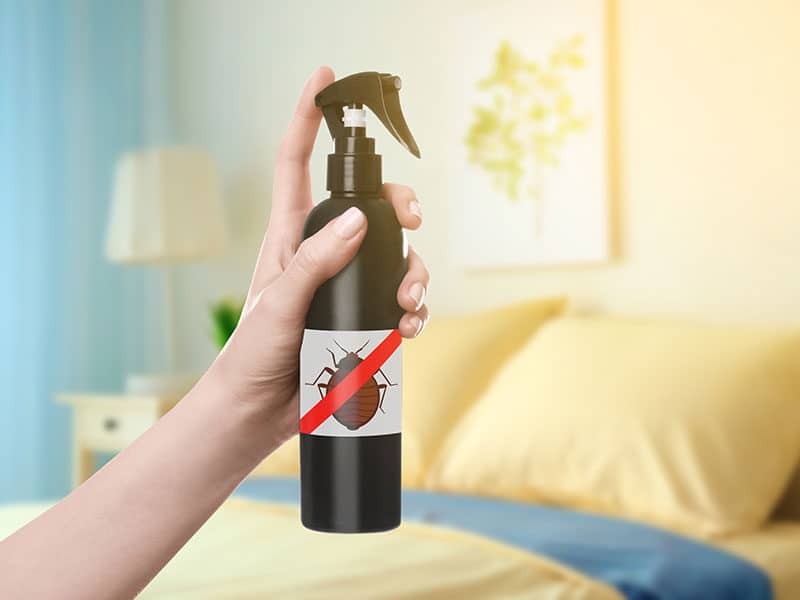
Essential oils like lavender and tea tree oil can be utilized as the key ingredients in killing bugs. However, let’s mix these oils with other materials and make the ultimate bed bug spray.
Ingredients:
- 5 drops of cedarwood essential oil
- 1 cup of water
- 5 drops of bergamot essential oil
- 1 tablespoon of pure witch hazel
- 5 drops of lavender essential oil
Instructions:
Mix all the ingredients in a clean spray bottle. Then, spray the solution onto the corners of your bedding and under any sheets.
Extra Tips
You can also try talcum powder to get these small but annoying beings out of your mattress and placing them in plastic bags. Just sprinkle talcum powder over the hotspots. The powder will dehydrate the bed bugs and destroy them. Finally, clean your mattress with a mattress vacuum cleaner.
Related Questions
Sweet Dreams Aren’t Made of Bed Bugs
When you fall asleep, you don’t want bloodsuckers to leave their hiding spots and feed off of you. They bite over and over again, leaving people with uncomfortable bites.
If this happens to you, try some of the natural remedies or essential oils recommended in today’s article. Or make the ultimate homemade bed spray with white vinegar and act fast.
Have you tried some of these methods yet? What works for you? Feel free to share your experiences or questions in the comments and share this article with your friends.
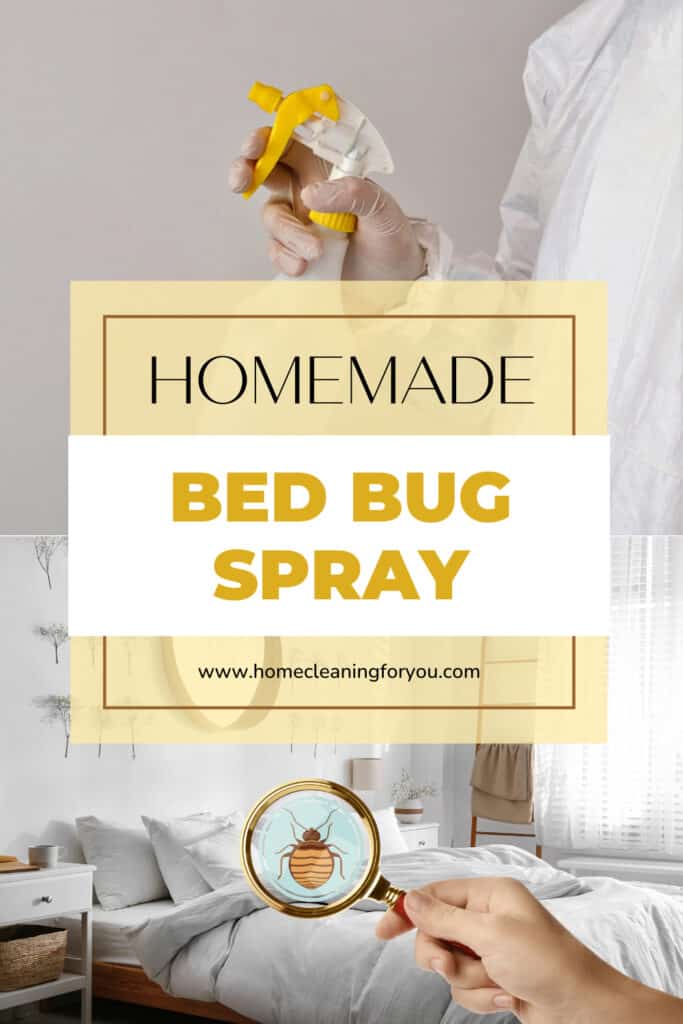

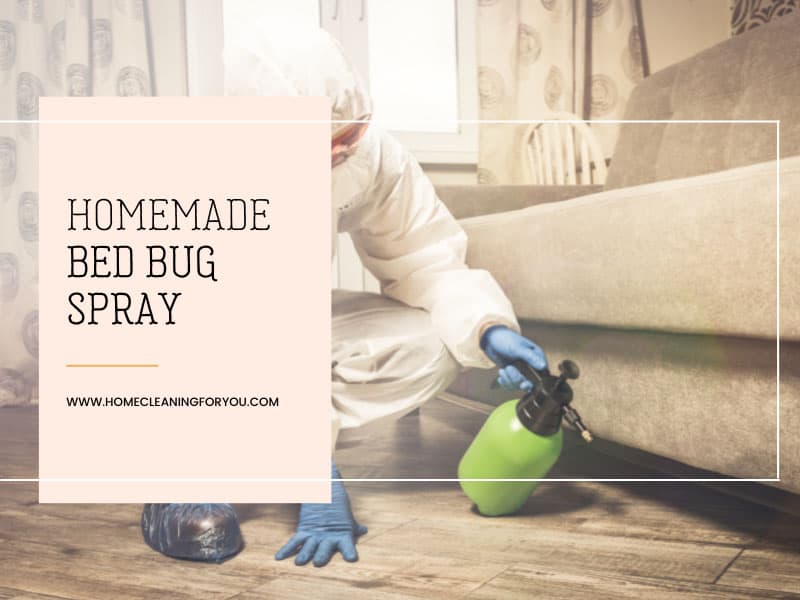

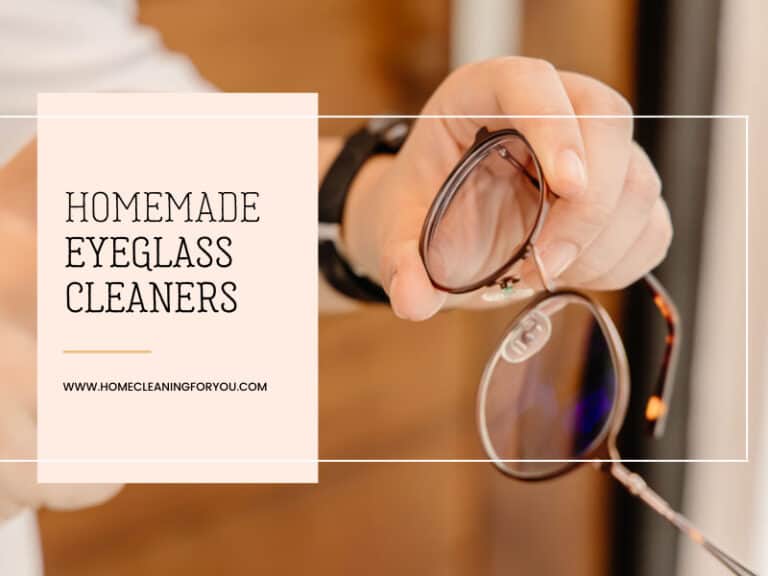
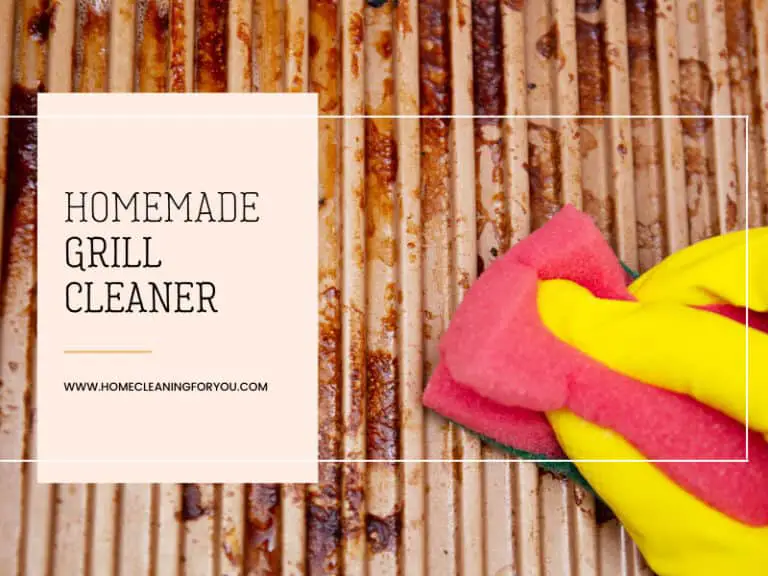
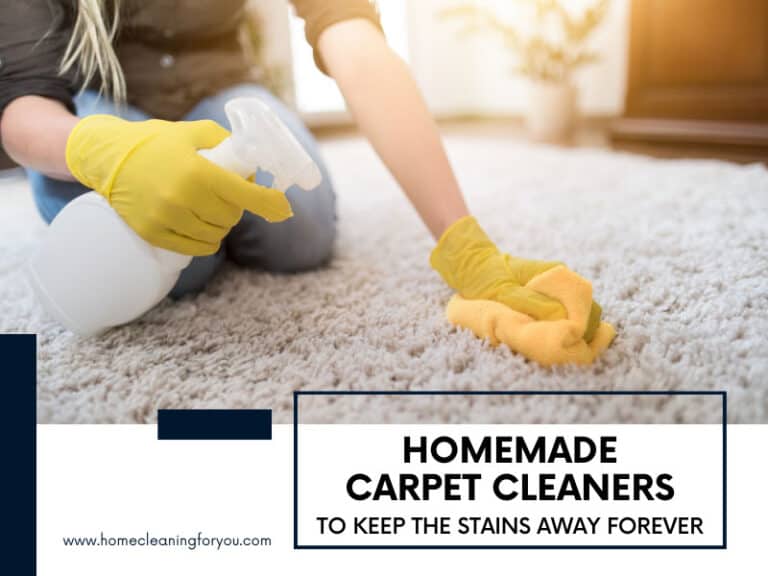
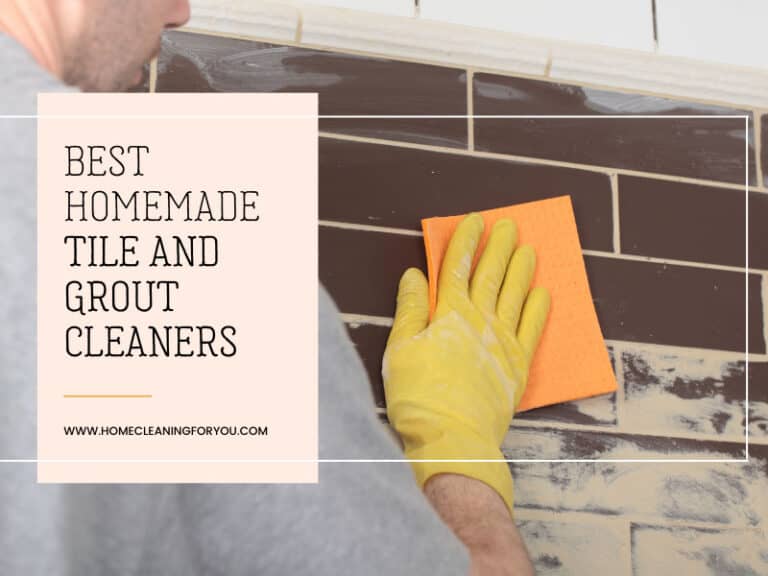

Kevin Jones
Home Cleaning Specialist
Expertise: In-depth Knowledge of Cleaning Agents and Their Uses, Advanced Home Sanitization, Techniques Expertise in Cleaning and Maintaining, Various Floor Types, Innovations in Home Cleaning Tools
School: American College of Home Economics
Kevin Jones is a seasoned home cleaning specialist with over a decade of experience in the industry. A stickler for cleanliness and organization, Kevin brings a systematic and innovative approach to home maintenance. His expertise ranges from traditional methods to modern cleaning technology, ensuring homes are not just clean but healthy environments too.